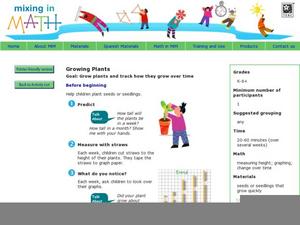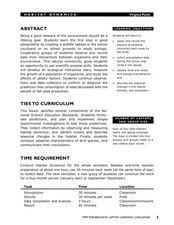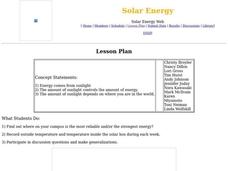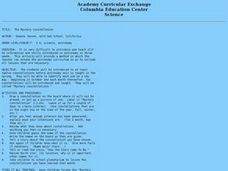Curated OER
Celebrating Earth Day
Students explore environmental safety by planting seeds outside their classroom. In this Earth Day lesson, students identify the different ways to recycle and conserve resources on Earth while facilitating recycling bins around campus....
Curated OER
DAY AND NIGHT
Students use a lamp as the sun and his/her body as the earth. They rotate in different directions to explain how the earth moves around the sun. Using specific questions in their discussion, students discover the reasons for day and night.
Core Knowledge Foundation
A Time for All Seasons - Winter
As the days get shorter and a chill enters the air, it's time to start teaching your little ones about the wondrous winter season. Through a series of teacher demonstrations, whole-class read alouds and discussions, and hands-on...
PBS
The Cat in the Hat Activity Exploring Weather
Observe different types of weather right in your classroom! Here, pupils look at clouds, rain, snow, wind, and hot and cold temperatures, and observe these weather patterns at school. They keep track of their observations in a worksheet...
Math Stars
Math Stars: a Problem-Solving Newsletter Grade 8
You've just hit the jackpot of integrating math problems and riddles with this jumbo-sized resource! Written as a newsletter, scroll through 35 pages of puzzles and quality problems to engage and encourage your learners to inquire...
Math Stars
Math Stars: a Problem-Solving Newsletter Grade 7
Put on your thinking caps because middle school math has never been more interesting in this huge resource full of thought provoking questions. Written as a newsletter, the resource has 10 two-page newsletters with a variety of...
Mixing In Math
Mixing in Math: Growing Plants
Whether you have your class plant seeds or begin when sprouts are visible, math skills are used here to predict and track growth over time. Straw bar graphs show plant height on a given day while the graph as a whole shows changes over...
Curated OER
Piles of Paper
Track how much paper their class uses in a week. They will pile their used paper into one place, each day the pile is measured. They make predictions about how much paper they would collect in a month, then recycle the paper.
Core Knowledge Foundation
A Time for All Seasons - Summer
The sun is shining and the birds are singing, what better time to teach young learners about the fun season of summer. In this week-long science series, children learn how the rotation and orbit of the earth influence...
Curated OER
Have You Looked Outside? Lesson #5- Graphing Weather Conditions
First graders study daily weather changes. For this weather and graphing lesson, 1st graders chart the daily weather for a month using stickers or weather symbols. They graph the weekly weather so that at the end of the month students...
Curated OER
Differences between Climate and Weather
Learners collect weather data over weeks, graph temperature data and compare the temperature data collected with averaged climate data where they live.
Curated OER
"Leaf" It in Your Yard
Students research about the process of composting. Students apply their research by creating a compost pile at school that will be maintained once or twice a month for the remainder of the school year.
Balanced Assessment
Fermi Estimates I
Enrico Fermi, the physicist responsible for the first nuclear detonation, was known for his ability to estimate with little or no data. Use this task to have your classes practice their Fermi skills. They estimate the magnitude of three...
Curated OER
Supreme Court Shake-Up
Students examine the role of the Supreme Court through an interactive program. They analyze the history of the Court and its members. They finally explore how the Supreme Court works.
Curated OER
Pay Day!
Students apply mathematical skills to solve problems using data brought in by the Navy speaker. They use critical thinking skills to create their own story problems. Students exchange story problems among students to analyze and try to...
Hubbard's Cupboard
The Pilgrims' First Thanksgiving
Students explore holidays by participating in class singing activities. In this Thanksgiving history lesson, students discuss the importance of Thanksgiving Day and read several poems which discuss the history of Thanksgiving. Students...
Curated OER
Habitat Dynamics
Young scholars develop an interactive diary to record bird seed consumption. In this habitat lesson, students predict and record the amount of birdseed eaten each week by birds.
Curated OER
Weather Report Chart
Students complete a weather report chart after studying weather patterns for a period of time. In this weather report lesson, students measure temperature, precipitation, cloud cover, wind speed, and wind direction for a month. Students...
Curated OER
Solar Energy
Students find out where on campus is the most reliable and/or the strongest energy, record outside temperature and temperature inside the solar box during each week, and participate in discussion questions and make generalizations.
Curated OER
I Think I Forgot Something!
Students examine human health by reading a children's book in class. In this breakfast lesson, students identify the importance of starting the day with a good, nutritious meal. Students read the book I Think I Forgot Something and...
Curated OER
What's the Matter with My Orange?
Students use oranges to informally explore decomposition, dehydration, fermentation, the water cycle, bacteria, yeast, food webs, the needs of living things, and physical vs. chemical change over a period of three or more months.
Curated OER
Mystery Constellations
Fourth graders predict constellations each month. In this astronomy lesson, 4th graders are presented with two constellations every month, and guess what they are as clues are given.
Curated OER
The Mystery Constellation
Students decipher two teacher chosen mystery constellations a month. They listen to stories, explain what they know about constellations and name the mystery constellation.
Curated OER
Mini-Sanitary Landfill
Second graders work in groups to bury a variety of trash items and arrange them in a mini-landfill. They predict which items will biodegrade and then keep records of what the items look like every ten days. Students consider how...























